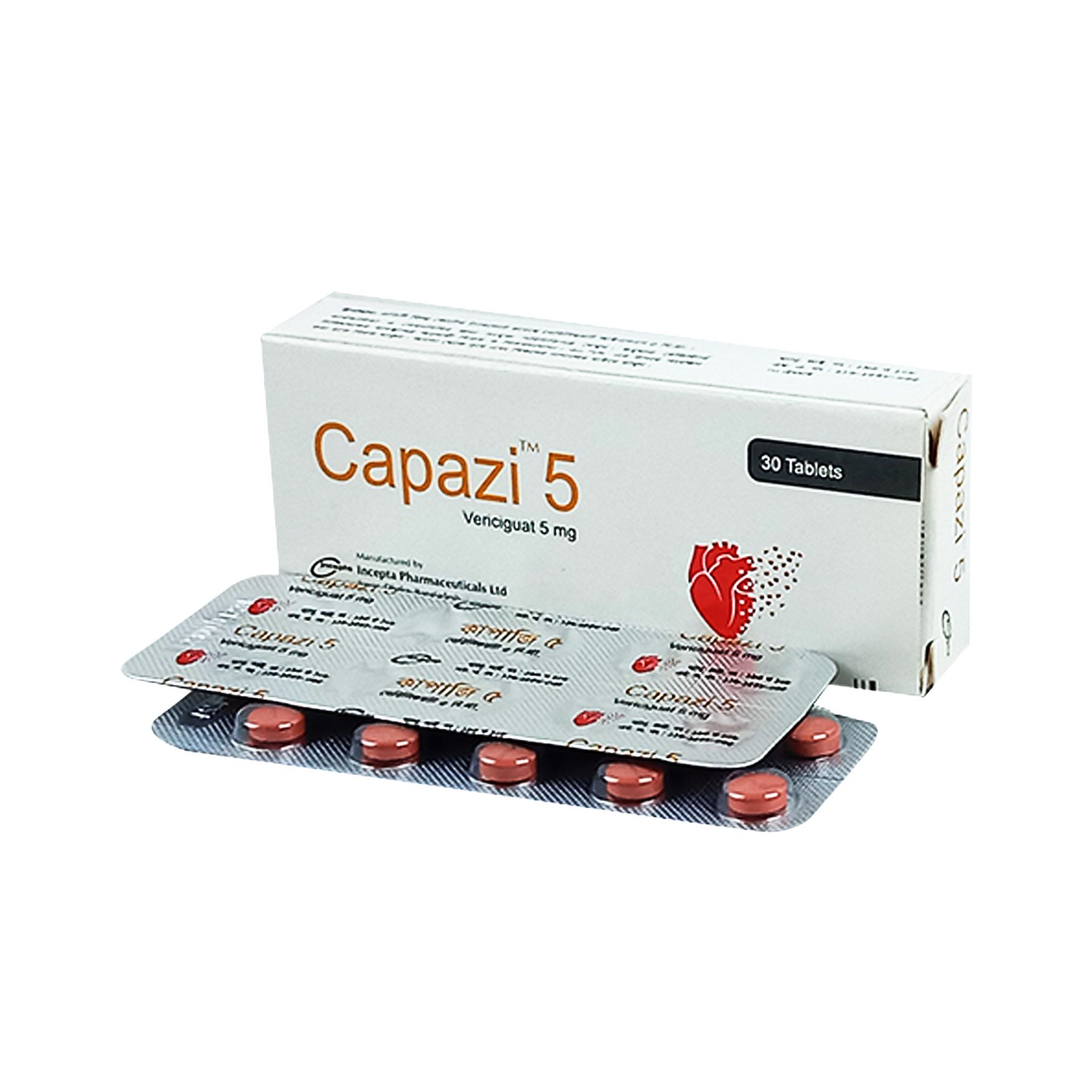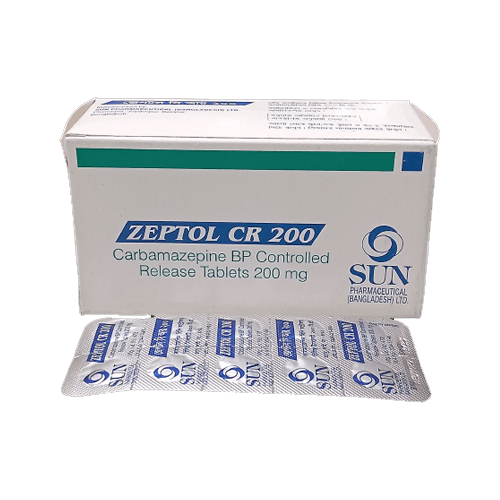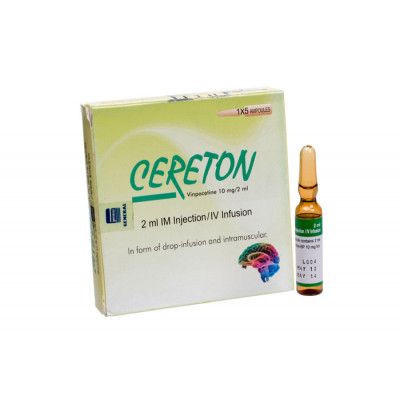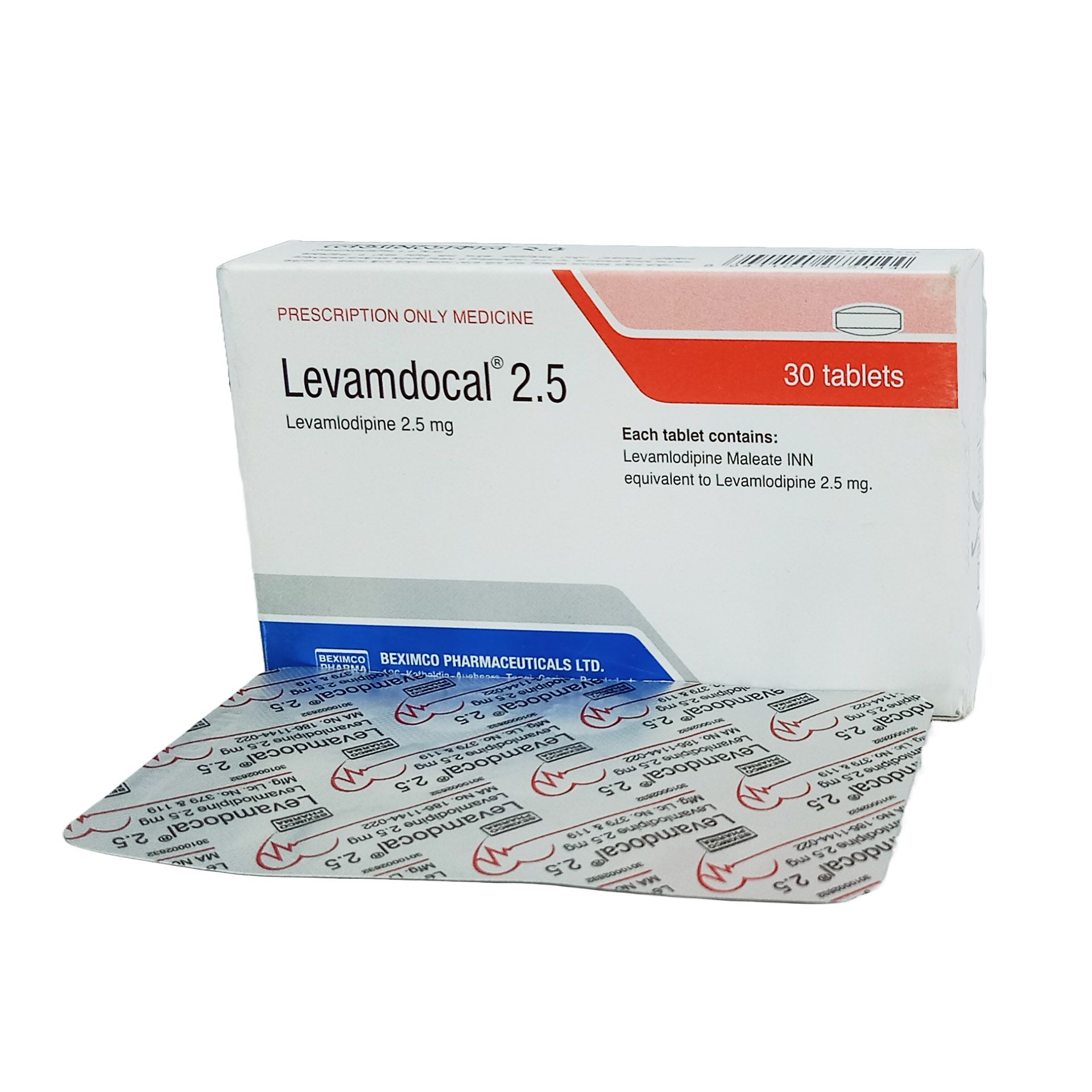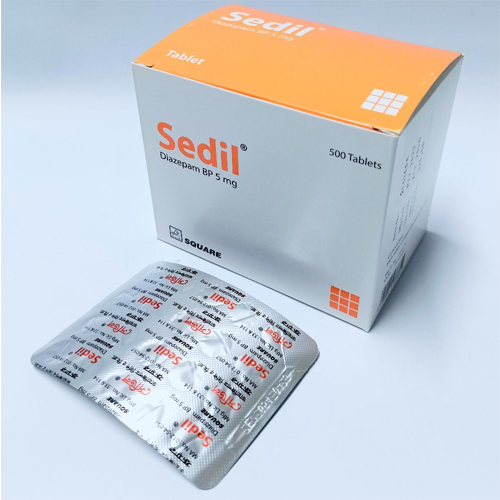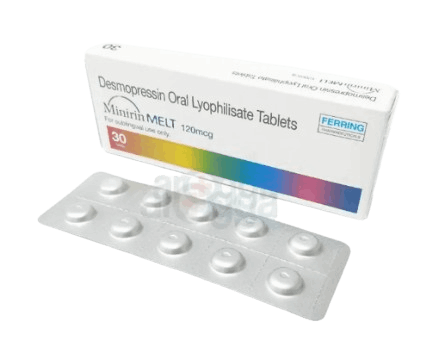

Minirin Melt 120 - 1 box
(0
reviews)
Sold by
Ashik Medical
Price
৳2,970.00
৳3,300.00
/pc
-10%
Club Point:
200
Refund
Not Applicable
Share
Top Selling Products
-
৳450.00
৳500.00 -
৳64.00
৳70.00 -
৳36.11
৳40.12 -
৳94.50
৳105.00 -
৳12.42
৳13.80
Reviews & Ratings
0
out of 5.0
(0
reviews)
There have been no reviews for this product yet.
Medicine Overview of Minirin Melt 120 120mcg Tablet
Introduction
Minirin Melt 120 is a medicine used in the treatment of diabetes insipidus and bed-wetting. It helps decrease the urge to urinate and help resume more normal life-style. Minirin Melt 120 can be taken in an empty stomach or after food. Your doctor will decide the dose and how often you should take them. You should use it regularly to get the most benefit from the medicine. Do not stop using the medicine even if you feel better unless the doctor tells you so. Some common side effects of this medicine include headache, stomach pain, and nausea. Let your doctor know if any of these side effects do not go away or get worse. Before using this medicine, inform your doctor if you have any problems with your heart, liver, or kidneys. You should also tell your doctor all the other medicines you are taking. Your doctor may monitor your blood glucose regularly while on treatment with this medicine.
Uses of Minirin Melt 120
- Diabetes insipidus
- Bed-wetting
Side effects of Minirin Melt 120
Common
- Headache
- Nausea
How to use Minirin Melt 120
Take this medicine in the dose and duration as advised by your doctor. Swallow it as a whole. Do not chew, crush or break it. Minirin Melt 120 may be taken with or without food, but it is better to take it at a fixed time.
How Minirin Melt 120 works
Minirin Melt 120 is a synthetic form of vasopressin (natural hormone that balances water). It works by causing reabsorption of water from the kidneys which controls excessive thirst and urination in diabetes insipidus. It also helps decrease night-time urine production and bedwetting in children. In addition to these, it reduces bleeding episodes by promoting the release of blood clotting factors.
What if you forget to take Minirin Melt 120?
If you miss a dose of Minirin Melt 120, skip it and continue with your normal schedule. Do not double the dose.
Quick Tips
- You have been prescribed Minirin Melt 120 for the treatment of diabetes insipidus and/or bed-wetting.
- Limit the amount of fluids you drink with this medication.
- Minirin Melt 120 can cause low sodium levels in your body. Get regular blood tests done to monitor the levels.
- Inform your doctor if you develop an infection, fever, diarrhea, or vomiting.
- Talk to your doctor if you have sudden weight gain or swelling in your arms and legs that does not go away.
Brief Description
Indication
Diabetes Insipidus, Hemophilia A, Von Willebrand Disease (Type 1), Nocturnal Enuresis, Nocturia, Uremic Bleeding in Acute or Chronic Renal Failure
Administration
May be taken with or without food. IV infusion: Dilute in 10 mL or 50 mL of NaCl 0.9% inj.
Adult Dose
Diabetes Insipidus Intranasal Indicated as antidiuretic replacement therapy in the management of central cranial diabetes insipidus and for management of the temporary polyuria and polydipsia following head trauma or surgery 10-40 mcg (0.1-0.4 mL) qDay, either as a single dose or divided into 2 or 3 doses; usual dose is 20 mcg (0.2 mL) qDay in 2 divided doses Adjust morning and evening doses separately for an adequate diurnal rhythm of water turnover PO Initial: 0.05 mg q12hr Effective range: 0.1-1.2 mg divided q8-12hr Observe fluid restriction If switching to PO from intranasal, start PO at least 12 hours after last intranasal dose IV/SC 2-4 mcg/day divided q12hr or one-tenth the maintenance of intranasal dose Hemophilia A IV Indicated for patients with hemophilia A with factor VIII coagulant activity levels greater than 5% 0.3 mcg/kg IV over 15-30 minutes (for pre-op, 30 min before procedure) Intranasal Indicated for patients with mild to moderate classic von Willebrand disease (Type I) with Factor VIII levels >5% <50 kg: 150 mcg; for pre-op, give 2 hr before procedure >50 kg: 300 mcg; for pre-op, give 2 hr before procedure Von Willebrand Disease (Type 1) IV Indicated for patients with mild to moderate classic von Willebrand’s disease (Type I) with factor VIII levels greater than 5% 0.3 mcg/kg IV over 15-30 minutes (for pre-op, 30 min before procedure) Intranasal Indicated for patients with mild to moderate classic von Willebrand disease (Type I) with Factor VIII levels >5% <50 kg: 150 mcg; for pre-op, give 2 hr before procedure >50 kg: 300 mcg; for pre-op, give 2 hr before procedure Nocturnal Enuresis Primary nocturnal enuresis (not intranasal) 0.2 mg PO qHS (up to 0.6 mg/day) Nocturia Nocturnal polyuria was defined in clinical trials as nighttime urine production exceeding one-third of 24-hour urine production Preservative-free nasal spray Indicated for nocturia due to nocturnal polyuria in adults who awaken at least 2 times per night to void >50 to <65 years 1 spray of 1.66 mcg in either nostril nightly ~ 30 min before going to bed >65 years 0.83 mcg in either nostril nightly ~ 30 min before going to bed; 0.83 mcg dose may have a lower risk of hyponatremia; may be increased to 1 spray of 1.66 mcg after at least 7 days, if needed, provided serum sodium has remained normal Sublingual tablets Indicated for nocturia due to nocturnal polyuria in adults who awaken at least 2 times per night to void Before starting or resuming, assess the sodium concentration and only start or resume in patients with a normal serum sodium concentration Women: 27.7 mcg SL qDay, 1 hr before bedtime, administered SL without water Men: 55.3 mcg SL qDay, 1 hr before bedtime, administered SL without water Uremic Bleeding in Acute or Chronic Renal Failure 0.4 mcg/kg IV over 10 minutes
Child Dose
Diabetes Insipidus Nasal spray Indicated as antidiuretic replacement therapy in the management of central cranial diabetes insipidus and for management of the temporary polyuria and polydipsia following head trauma or surgery in the pituitary region in patients (>3 months) <3 months: Safety and efficacy not established 3 months-12 years Usual dosage range is 5-30 mcg (0.05-0.3 mL) qDay, either as a single dose or divided into 2 doses About 1/4 to 1/3 of patients can be controlled by a single daily dose of DDAVP administered intranasally Adjust doses separately for appropriate diurnal rhythm of water turnover if administering more than once a day >12 years 10-40 mcg (0.1-0.4 mL) qDay, either as a single dose or divided into 2 or 3 doses; usual dose is 20 mcg (0.2 mL) qDay in 2 divided doses Adjust morning and evening doses separately for an adequate diurnal rhythm of water turnover Nocturnal Enuresis >6 years: 0.2 mg PO qHS (up to 0.6 mg/day) Hemophilia A & Von Willebrand Disease Indicated for patients with hemophilia A or von Willebrand disease (type 1) with Factor VIII coagulant activity levels >5%; will also stop bleeding in patients with episodes of spontaneous or trauma-induced injuries (eg, hemarthroses, intramuscular hematomas, mucosal bleeding) IV Infants >3 months, children, and adolescents 0.3 mcg/kg IV If used preoperatively, administer 30 min before procedure May repeat dose if needed Intranasal Infants >11 months, children, and adolescents <50 kg: 150 mcg intranasally >50 kg: 300 mcg intranasally If used preoperatively, administer 2 hr before procedure Fluid intake should be limited 1 hr prior to dose until the next morning or at least 8 hr after administration Repeat use determined by clinical symptoms and laboratory values
Renal Dose
Renal impairment CrCl <50 mL/min: Contraindicated; has been used unlabeled in acute and chronic renal failure patients experiencing uremic bleeding or prevention of surgical bleeding CrCl >50 mL/min: No adjustments necessary
Contraindication
Cardiac insufficiency w/ ongoing diuretic treatment. Patient w/ habitual and psychogenic polydipsia, hyponatraemia or history of hyponatraemia. Moderate to severe renal impairment (CrCl <50 mL/min).
Mode of Action
Desmopressin increases cyclic adenosine monophosphate (cAMP) in renal tubular cells which increases water permeability resulting in reduced urine volume and enhanced urine osmolality. It also stimulates factor VII and plasminogen activator activity in the blood, but w/ minimal pressor activity. Onset: Antidiuretic: Approx 60 min (oral); 15-30 min (intranasal).
Precaution
Patient w/ CV disease or cystic fibrosis, coronary artery insufficiency, at risk for increased intracranial pressure, predisposed to thrombus formation. Elderly and childn. Pregnancy and lactation.
Side Effect
>10% Dry mouth, men (14%) Dry mouth, women (12%) 1-10% Headache (2-5%) Hyponatremia, men (4%) Headache, men (4%) Hyponatremia, women (3%) Dizziness, men (3%) Dizziness (3%) Epistaxis (2-3%) Headache, women (2%) Dizziness, women (2%) Nasal spray Rhinitis (3-8%) Abdominal pain (2%) Asthenia (2%) Chills (2%) Nostril pain (2%) Gastrointestinal disorder (2%) Nausea (2%) Conjunctivitis (2%) Eye edema (2%) Lachrymation disorder (2%) Frequency Not Defined Abnormal blood pressure (infrequent) Increased heart rate Increased blood pressure Flushing Seizure (rare) Hyponatremia Hyposmolality (rare) Water intoxication syndrome Thromboembolic disorder Allergic reaction (acute) Anaphylaxis (rare)
Pregnancy Category Note
Pregnancy Prolonged experience with desmopressin in pregnant women over several decades, based on available published data and case reports, did not identify a drug associated risk of major birth defects, miscarriage or adverse maternal or fetal outcomes; in addition, in vitro studies with human placenta demonstrate poor placental transfer of desmopressin; no adverse developmental outcomes were observed in animal reproduction studies with administration of desmopressin during organogenesis to pregnant rats and rabbits at doses approximately <1 and 38 times, respectively, the maximum recommended human dose based on body surface area (mg/m²) Not recommended for treatment of nocturia in pregnant women; nocturia is usually related to normal, physiologic changes during pregnancy that do not require treatment Lactation Desmopressin is present in small amounts in human milk and is poorly absorbed orally by infant There is no information on effects of desmopressin on breastfed infant or on milk production; development and health benefits of breastfeeding should be considered along with mother’s clinical need for therapy and potential adverse effects on breastfed infant from therapy or from the underlying maternal condition
Interaction
May enhance antidiuretic effect w/ NSAIDs (e.g. ibuprofen), indometacin, TCAs, chlorpromazine, carbamazepine, SSRIs, opiates, lamotrigine. May reduce antidiuretic effect w/ lithium, epinephrine (large dose), heparin, demeclocycline.
Frequently Bought Products
Product Queries (0)
Login Or Registerto submit your questions to seller
Other Questions
No none asked to seller yet
Top Selling Products
-
৳450.00
৳500.00 -
৳64.00
৳70.00 -
৳36.11
৳40.12 -
৳94.50
৳105.00 -
৳12.42
৳13.80

